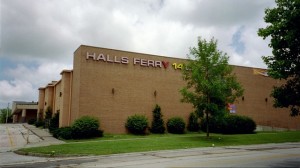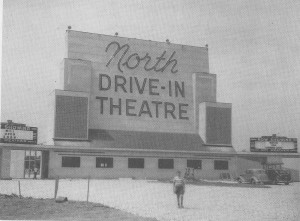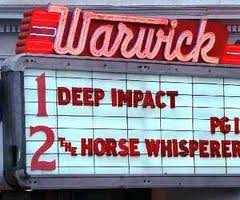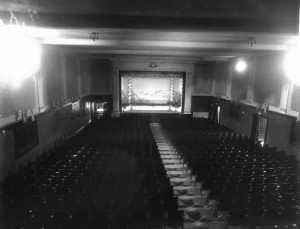
Wehrenberg’s Halls Ferry 14 which opened with 6 screens in the 1970s, expanded to 8 in 1982 while I worked there as an assistant manager and added 6 more screens later on. It closed in 2002 and was torn down in 2010.
There were two other assistant managers at the Halls Ferry Eight: a short, young, energetic African American woman who taught in an elementary school during the day and Ed who was there my first night at the Halls Ferry Six. He was maybe a decade older then I was and a few inches taller, but his girth, like mine, tended to obesity. His face was round and large, topped by receding brown hair with a few flecks of gray at the sides. Like most male assistant managers he wore a sport jacket with a tie and dark trousers. (Ed, and the names of several other people in these stories have been changed for obvious reasons.)
We were both bigger than Randy the manager, a compact man in his late twenties with a mustache who was a couple of inches shorter that I was.
Ed had a quick sense of humor, boundless confidence, and a commanding voice. In real life, he was associate superintendent in a near-by school district. These qualities served him well when he had recently confiscated a loaded pistol from a violent student during a fight. And he liked to tease our lead cashier, a high spirited girl—one of his former students—for being a “bimbette.” He explained why he worked at a movie theater.
I need the theater job to pay for the used Cadillac I had always wanted and to fill the weekend evenings before my drive over to East St. Louis to play cards. I have friends there. In fact, I went to high school with one of them, a guy named Red. He runs the kind of high-stakes games I like to play. He has a sign just inside the door to his place that says “NO ONE SHOULD KNOW THAT YOU’VE BEEN HERE.”
I’d already guessed that Red’s operation was well outside the law; this was the early 1980’s, a decade before Missouri or Illinois legalized casinos. And, completing his resume, Ed said, “And I just finishing writing a book—a history of my school district.” Knowing that a fellow assistant manager had an academic side, I began to feel more at ease in the theater.
One night, he called us into the tiny manager’s office. For three of us to fit, we had to drag in a third chair from the box office while Randy, the manager, squeezed in behind his desk. Given Ed’s size and mine, we could barely close the door. He wanted to tell us what had happened the previous weekend.
Last Saturday after I left here for the East Side some car ran me off the road just before the Chain of Rock Bridge over the Mississippi. I wasn’t hurt, and there was no damage, but I got a license number.
When I got to Red’s place I told him about the car running me off the road.”
Wednesday he calls me: “We had some of the guys hang out in a couple of 7-11s on your side of the river to see what they could pick up. Turned out it was a bunch of college kids on vacation from Northwest Missouri State. They were high on drugs and couldn’t remember anything. By the way, one of their houses burned down Monday night.”
Oh No! You didn’t?
“No, No,” Red assured me, “We didn’t do it; it was just a coincidence.”

The Casino Queen, offering the first legal gambling in the St. Louis region, opened in 1993 in East St. Louis, IL.
I was horrified by the risk that Ed was taking with his illegal gambling and acceptance of small favors from the mob. Besides, he was top official in a large school district and vulnerable to blackmail. I looked at him, tilted my head and shook it a little bit, but said nothing. With all my money problems, I could have used favors, too, but I wasn’t anywhere near willing to appeal to gangsters. I knew someone back east who had a family connection, but I wouldn’t think of approaching him.
A few weeks later Ed had another tale about Red and his East Side mob:
My daughter is in high school at Pattonville. That’s the district where we live, not the one where I work. She broke up with her boyfriend, and about a week later, some of the boyfriend’s buddies threatened to beat her up and knocked her to the ground as she got out of her car. I called Red and he said that he would send a “unit” over to check things out. A few days later, one of the boy’s parents calls me.
“What the hell do you think you’re doing, siccing gangsters on my child? These two large men knocked on our door at six A.M. and threatened our boy with broken legs if he ever went near your daughter again. Now he’s scared to leave the house at all.”
I told the parent that I’ll do anything I need to, to protect my family.
I was more appalled than before: Ed was placing his family under obligation to mobsters, too.

Another version of the Wehrenberg Theaters logo. The chain’s official name is “The Fred Wehrenberg Circuit of Theaters, Inc.”
Fortunately, I didn’t have to cope with Ed’s gangster friends. Instead, in the early fall of 1982 I was promoted to manager and given a theater of my own, The Cross Keys Cinema about four miles north of the Halls Ferry Eight.
Next time – Cross Keys







